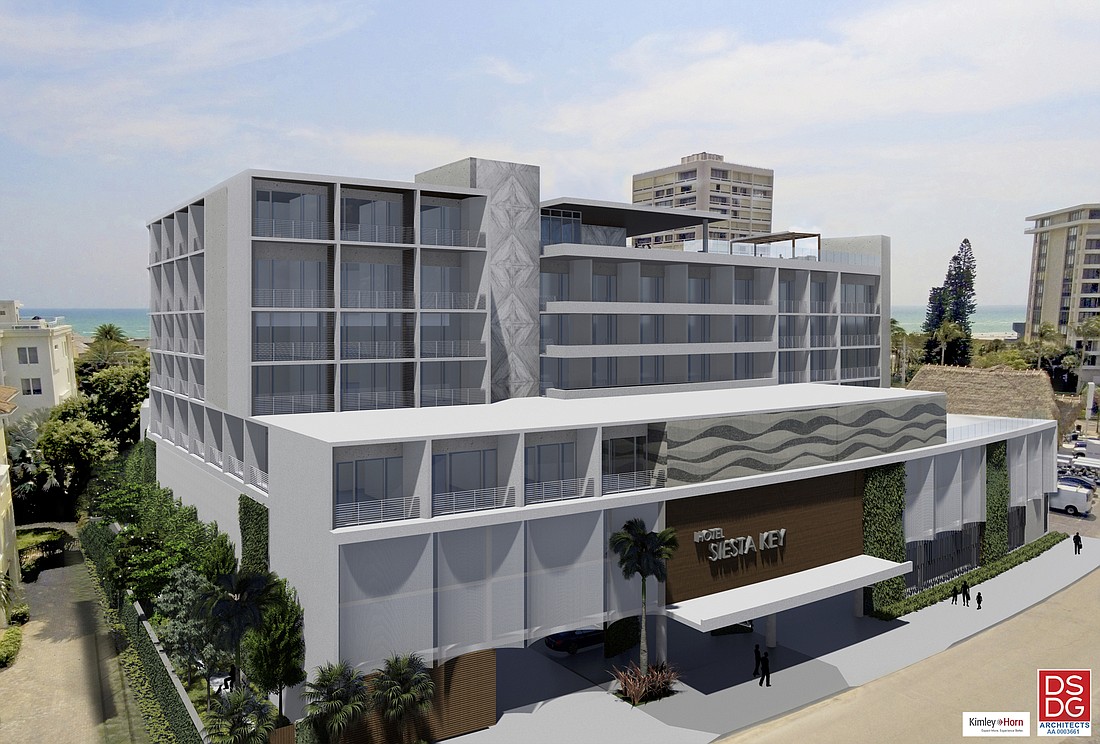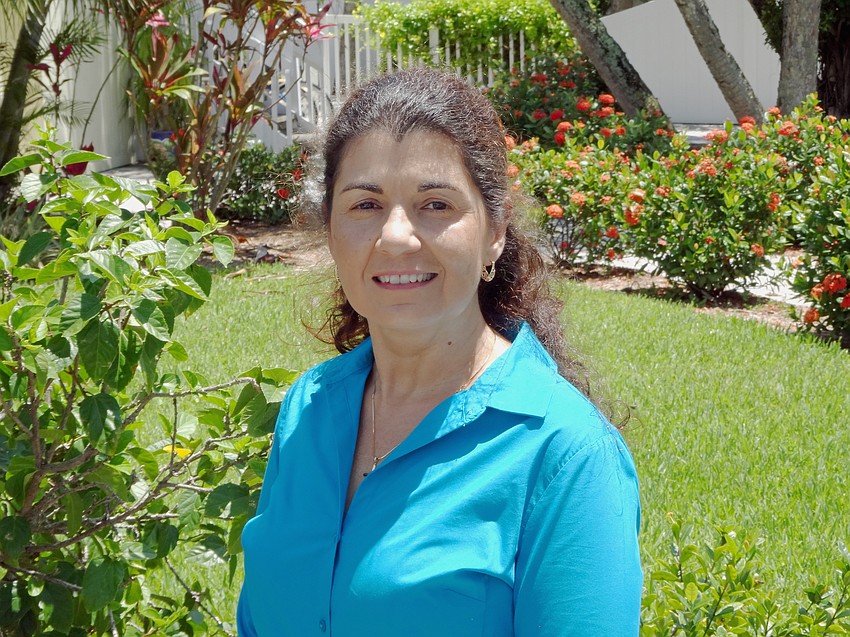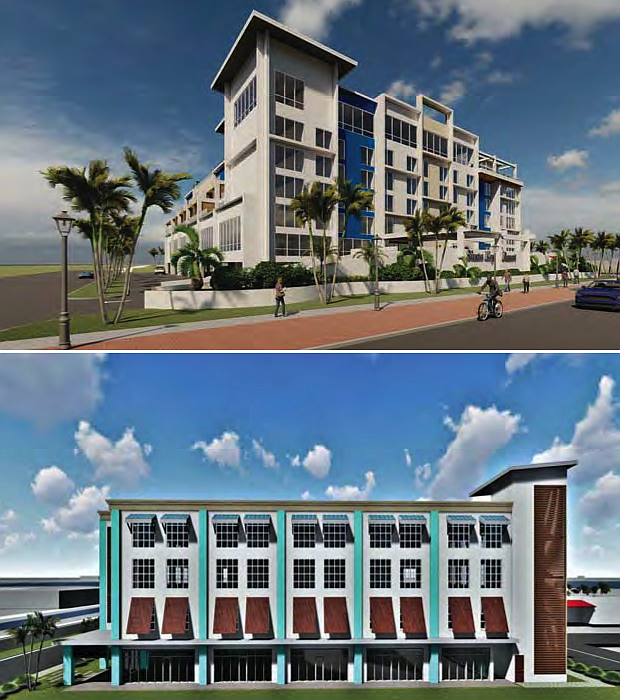- April 23, 2025
-
-
Loading

Loading

Although Siesta Key residents opposed to two planned hotels on the barrier island recently scored an initial victory in their effort to keep them from being built, there remains a lengthy legal battle ahead.
On April 3, Administrative Law Judge Suzanne Van Wyk ruled in favor of plaintiff Lourdes Ramirez that Sarasota County’s 2021 approval of a 170-room hotel on a 0.97-acre site on Calle Miramar in Siesta Key Village violated the county’s comprehensive plan that since 1981 had set density limits of residential developments at 26 units per acre. The county and the developer have 30 days to respond.
At the time, hotels were categorized as residential as Siesta Key was experiencing rapid growth in both development and tourism.
In fall 2021, the Sarasota County Commission approved not only the new hotel in Siesta Key Village but also a second 120-room hotel on 1.17 acres on the south of the island at 1260 Old Stickney Point Road. In the process, hotels were reclassified from residential to commercial use, clearing the way for rezoning and approval of the projects. County staff at the time said removing the residential density cap did not violate the comprehensive plan because hotels were no longer residential, and therefore not subject to the limits.
New hotels had been discussed since 2016, Ramirez said, but prior to 2021 density had not been among the details.

“And then we found out that there was a proposed ordinance that eliminated the density for hotels, saying hotels are not a residential use and it should be based on square footage,” Ramirez said. “I found that problematic because since the 1980s on Siesta Key we’ve had a maximum number of units that can be built.”
The Division of Administrative Hearings is a state-level process that is one of two parallel legal tracks affecting the hotels. The division ruling applies to the challenge over an alleged violation of a county’s comprehensive plan because the state does not intervene on developments, only on zoning ordinances.
In her ruling, Van Wyk found that the county’s 1981 Comprehensive Plan “specifically discusses the barrier islands as an area of special concern,” acknowledging the “problems associated with development on the barrier islands,” including “the detrimental effect of building along the active beach areas” and ‘“difficulties of evacuating large numbers of people from the keys in time of emergency.”
Further, she wrote, “Barrier Islands are so designated because they help protect the mainland from storm damage in hurricanes and other storms,” and “The entirety of Siesta Key is designated Coastal High Hazard Area … and is within the county’s Hurricane Evacuation Zone A, which is required to evacuate for a Category 1 hurricane.”
The 12th Judicial Circuit Court will preside over a local case on whether the approval of the hotels themselves are in violation of the comprehensive plan.
“If you read the zoning ordinance, it does violate the comprehensive plan, so the zoning ordinance is kind of null and void,” Ramirez said. “But the county approved the hotels with that zoning ordinance in place. In that case, you’ve got to go to Circuit Court to say hotels on these plots of land are in violation of the comprehensive plan.”
As the Division of Administrative Hearings awaits a response to Van Wyk’s ruling, action continues at the 12th Judicial Circuit Court. The cases against both Siesta Key hotels were consolidated for trial purposes because of overlap between the two lawsuits.

While Ramirez’s lawsuit focused on the Calle Miramar hotel and the single issue of its inconsistency with the comprehensive plan, the suit against the Old Stickney Point Road project includes five causes of action including the comprehensive plan issue. Judge Mark Walker ruled the two cases could be consolidated because expert testimony on both will be provided by the same witnesses.
Walker later recused himself from the case when he discovered he had a professional and personal relationship with the attorneys in the Old Stickney Point Road case, turning it over to Judge Hunter Carroll, who was scheduled to hold a case management hearing on Thursday regarding the consolidated cases trial scheduled for October.
Carroll has filed a notice of disclosure, revealing he had once represented Gary Kompethecras, who owns the property for the Stickney Point Road hotel, while he was a practicing lawyer, but had not as of yet recused himself from the case.
Meanwhile, the hotels are in limbo as they await rulings, which could be appealed by either party. The hotel controversy helped galvanize the movement to incorporate Siesta Key as its own town. Although Ramirez is not involved in that effort, she does support it.
Whether to permit a referendum in November 2024 for affected residents to vote on incorporation is currently working its way through the Florida House of Representatives.
“The county doesn't care about Siesta Key, and we have proof that they don't care about the Siesta Key," Ramirez said. "They are willing to ignore their own laws to our detriment. I'm not into wanting to pay for more taxes, but what is going on here when the county blatantly ignores that have been existence for decades, I think we will be in better hands.”